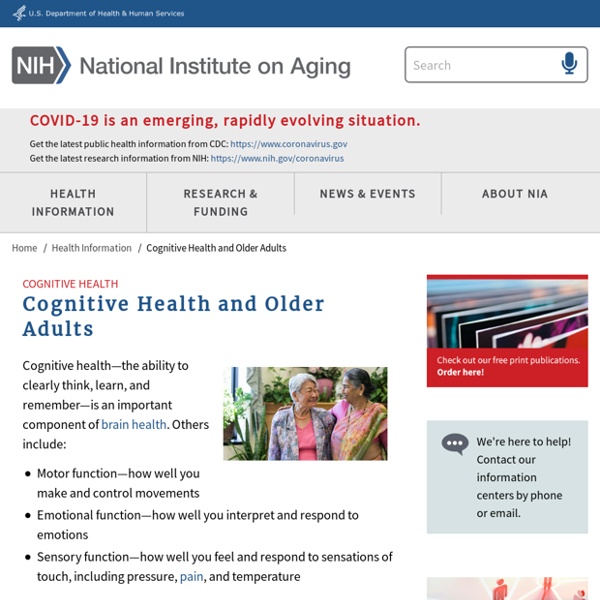6 Best Cognitive Games and Activities for Seniors
Has a senior loved one struggled to recall the name of an old friend or remember the street that their first house was located on? Little facts like these can be a challenge for seniors to remember as they get older. If someone you love faces memory challenges, don’t worry. There are steps they can take to keep their minds active and improve memory functions. Explore the best activities and cognitive games for seniors that will help their minds stay sharp.
Assessing Cognitive Impairment in Older Patients
As a primary care practice, you and your staff are often the first to address a patient’s complaints — or a family’s concerns — about memory loss or possible dementia.(1,2) This quick guide provides information about assessing cognitive impairment in older adults. With this information, you can identify emerging cognitive deficits and possible causes, following up with treatment for what may be a reversible health condition. Or, if Alzheimer’s disease or another dementia is suspected, you can help patients and their caregivers prepare for the future.
Free Printable: Sudoku Puzzles for Seniors
Fun puzzles keep senior minds sharp Research (and common sense) say that keeping the mind engaged is a great way to stay sharp while aging. Some studies have shown that brain exercises can keep seniors sharper for up to 10 years longer. Sudoku (sue-dough-coo) puzzles are a fun activity and sure to stimulate your older adult’s brain.
Regular exercise changes the brain to improve memory, thinking skills
There are plenty of good reasons to be physically active. Big ones include reducing the odds of developing heart disease, stroke, and diabetes. Maybe you want to lose weight, lower your blood pressure, prevent depression, or just look better.
Hippocampal and Cerebral Blood Flow after Exercise Cessation in Master Athletes
Introduction Endurance exercise training (exercise) produces physiological adaptations that enhance aerobic fitness and cardiovascular health (Brooks et al., 1996). Consistent exercise effectively augments the maximal rate of oxygen consumption (O2max) centrally, by increasing cardiac output, and/or peripherally by widening the arterial-venous oxygen (A-O2) difference (Seals et al., 1981). O2max is the gold-standard index of cardiorespiratory fitness and is highly correlated with both morbidity and mortality (Hoekstra et al., 2008; Sawada et al., 2012), with greater fitness status associated with a reduced risk of chronic disease and a longer lifespan.
Physical Activity for Older Adults
Significant health benefits are seen in adults aged 65 years and older who participate in regular physical activity. The 2008 Physical Activity Guidelines recommend older adults to incorporate aerobic activity, muscle-strengthening activity, and balance training for older adults at risk for falls. Try to avoid inactivity because some health benefits can occur with any amount of physical activity gain. Older adults need to evaluate their level of fitness before determining their level of effort for physical activity.
Alzheimer's stages: How the disease progresses
Alzheimer's stages: How the disease progresses Alzheimer's disease can last more than a decade. See what types of behaviors are common in each of the stages as the disease progresses. By Mayo Clinic Staff Alzheimer's disease tends to develop slowly and gradually worsens over several years.
Free Printable: Large Crossword Puzzles for Older Adults
Crossword puzzles exercise the brain Doing something that’s enjoyable and mentally stimulating can improve quality of life. In addition to the fun, studies have shown that brain exercises can keep seniors sharper for up to 10 years longer. And, games like crosswords may even help older adults prevent brain plaques associated with Alzheimer’s disease. To keep your older adult engaged and exercising their brain, we found a great source for free, large-print printable crossword and word search puzzles.
Brain health rests on heart health: Guidelines for lifestyle changes
Right now the world is experiencing an epidemic that is projected to get much, much worse. It’s an epidemic of dementia, affecting 50 million people and millions more of their caregivers — staggering numbers that are projected to triple by 2050. The dementia crisis is such a massive worldwide issue that the World Health Organization (WHO) announced a strategic public health action plan, including compiling an organized database of quality dementia research and creating guidelines for the prevention of dementia. The guidelines have just been published, a 96-page document that is summarized here, as well as in this post.
Tai chi have been found to improve cognitive function
There are lots of jokes about forgetting where you put your keys, but as you get older, changes in your mental function are no laughing matter. Changes in your brain that start around age 50 can affect your memory, as well as other cognitive functions such as your ability to juggle multiple tasks, process information rapidly, and focus on details. By age 70, one in six people has mild cognitive impairment (which can progress to Alzheimer's disease).




This resource emphasizes on the importance of our cognitive health and suggest ways in which older adults can maintain their cognitive abilities through staying active physically, mentally and socially. by ginnong Apr 8
The web page addresses how to maintain cognitive health through maintaining physical health, proper diets and engaging social activities. by klpeh005 Mar 28